If you’ve ever bought shrimp and tried to clean them only to find that they smelled like fish, this quick and easy hack can help you get rid of the smell or taste after cooking. This tip has helped me a lot since I first read it in a Chinese cookbook more than twenty years ago. It’s easy and doesn’t take long; I do it every time we have shrimp.
As a seafood lover, I enjoy cooking with shrimp often. However, nothing is more off-putting than the pungent fishy odor emanating from shrimp past its prime. If you’ve ever bought shrimp from the store or market that gave off a foul smell when you opened the package, you likely wondered – is my shrimp bad? Should shrimp actually smell fishy?
In this article I’ll explain what causes shrimp to smell fishy signs your shrimp has gone bad, and most importantly – how to ensure you pick fresh, non-smelly shrimp every time.
Why Does Shrimp Smell Fishy Sometimes?
Shrimp obtained straight from the ocean typically won’t have a very strong scent. However, once killed, stored, and transported to markets, chemical changes can cause compounds in their flesh to break down, creating a fishy ammonia-like odor.
Here are some key reasons your shrimp may develop a fishy smell
-
Improper handling and storage – Shrimp needs to be kept chilled at 40°F or less. Leaving shrimp at room temperature or repeatedly freezing/thawing allows bacteria and decomposition to occur faster, causing a stench.
-
Age – Like any seafood, shrimp has a relatively short shelf life. Shrimp more than 3-4 days old from time of catch will steadily grow more pungent.
-
Inadequate cleaning – Shrimp that hasn’t been properly deveined and rinsed can accumulate debris and bacteria that amplify odor.
-
Thawing techniques – Thawing frozen shrimp at room temperature instead of in the refrigerator allows proteins to break down faster.
As you can see, time, temperature control, and handling practices play a huge role in shrimp freshness and odor.
What Should Fresh Shrimp Smell Like?
When perfectly fresh, raw shrimp should have a mild, briny aroma similar to a sea breeze. You may notice a very slight hint of marine life but it shouldn’t have a bothersome ammonia or fishy odor.
The scent should never be so overpowering that you can smell it from more than a foot or two away. Discard any shrimp with an offensive, fishy stench.
Signs Your Shrimp Has Gone Bad
A fishy scent is one of the most common signs of spoiled shrimp, but here are a few other indicators the shrimp is past its prime:
- Change in texture – Slimey, mushy, or mealy texture
- Discoloration – Unnatural dark/dull spots
- Milky appearance – Loss of natural translucence
- Slimy residue – On container or cutting board after rinsing
- Soft flesh – Not firm to the touch
Ideally, shrimp flesh should be glistening, resilient, and free of any oozing liquid or goo. Discard at the first hint of spoilage.
How to Select the Freshest Shrimp
Follow these tips at the seafood counter or market to pick out quality shrimp every time:
-
Give it a sniff – Lean in and give the shrimp a gentle sniff. Pass on any packages with an overpowering odor.
-
Check the sell-by date – Try to select shrimp that still has 1-3 days before reaching the sell-by date for maximum freshness.
-
Look for vibrant color – Raw shrimp should be translucent with a natural pink/red tint. Avoid any dull or murky appearance.
-
Examine texture – Shrimp should be firm and resilient raw, not slimy or mushy. Press it lightly through the package.
-
Don’t buy damaged packages – Pass on packages with excessive liquid or that have leaks, rips, etc.
-
Ask questions – Inquire about the source, harvest date, and handling practices. This can give you insight into freshness.
Taking a few moments to carefully inspect your shrimp can help avoid disappointingly stinky results when you get home.
Proper Storage and Handling of Shrimp
Once you’ve selected your shrimp, proper storage and handling is key to preventing it from deteriorating into a fishy mess. Here are some tips:
-
Keep it chilled – Store raw shrimp in a bowl on ice or in the coldest part of your refrigerator.
-
Use promptly – Cook or freeze extra shrimp within 2 days of purchasing for optimal freshness.
-
Don’t cross-contaminate – Avoid storing raw shrimp near already cooked foods.
-
Limit temperature fluctuations – Prevent shrimp from sitting out too long during thawing or prep.
-
Freeze for longer storage – Divide into airtight portions and freeze. Defrost in the fridge, not on the counter.
Following basic food safety practices helps restrict bacteria growth that causes foul odors in shrimp and other seafood.
What If My Shrimp Smells Fishy?
We’ve all been there – you buy what looks like beautiful shrimp at the market but when you open the bag at home, the stench is undeniable. Is it still safe to eat if thoroughly cooked?
While cooking can destroy some bacteria, it likely won’t eliminate the strong odor already present. Plus, shrimp bordering on spoiled tend to get rubbery when cooked.
For shrimp with a mild hint of fishiness, techniques like brining in saltwater, marinating in citrus, and soaking in milk might help reduce some of the aroma. However, if the stench is clearly overwhelming, it’s safest to discard it.
The Bottom Line
The takeaway is that while fresh shrimp has an expected briny, ocean essence, it should never assault your nose with an ammonia-like fishiness. This unpleasant scent is generally a sign the shrimp is past its prime.
Following the selection tips above and practicing proper storage and handling once home will help ensure your shrimp maintains its delicate sweetness. With a little care, you can enjoy shrimp dishes all week long that are free of any funky fishy odors.
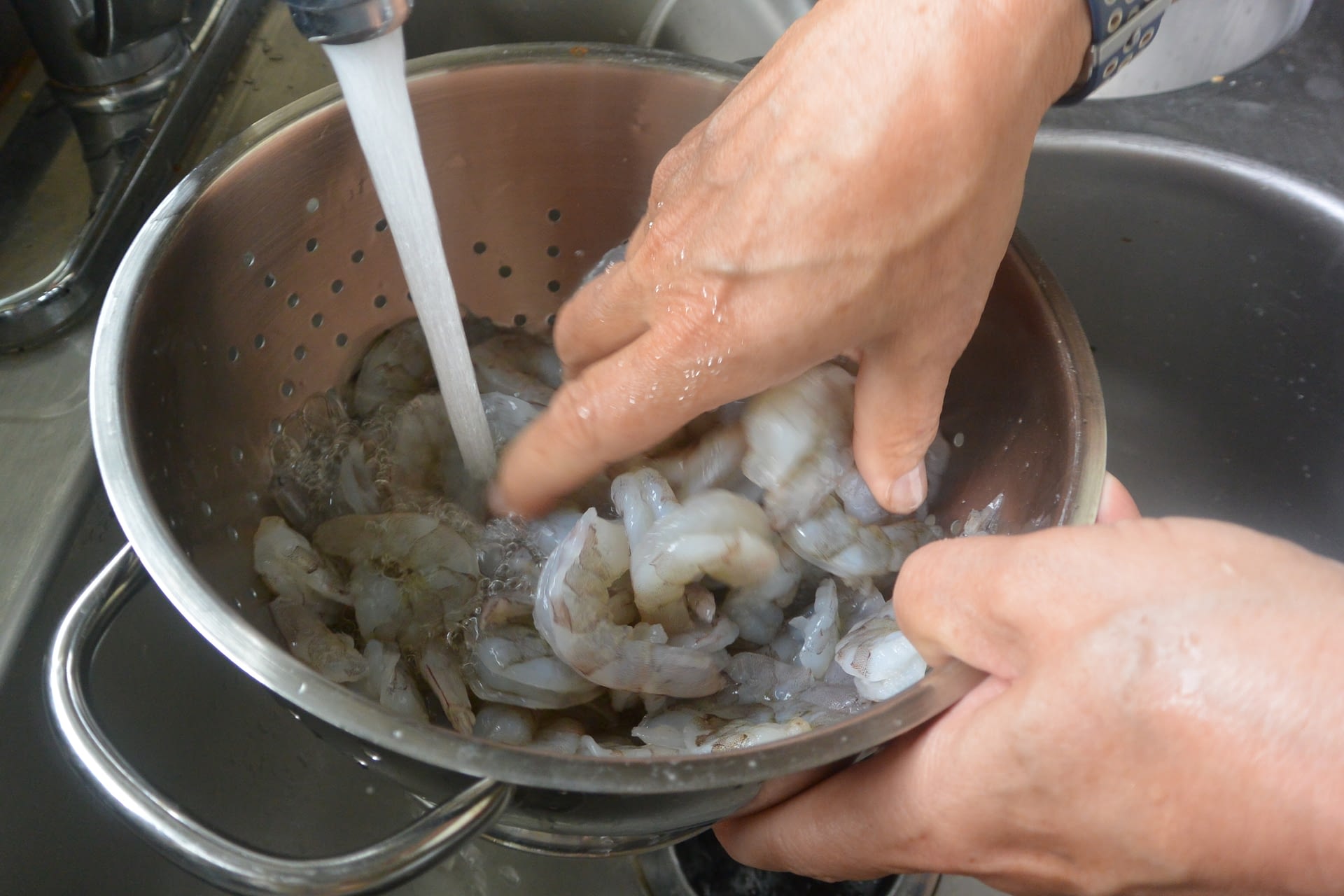
Hack to cut the Shrimp Smell
- Just add a teaspoon of salt,
- Stir for one minute, and
- Give it a good rinse.
- Repeat 3 times
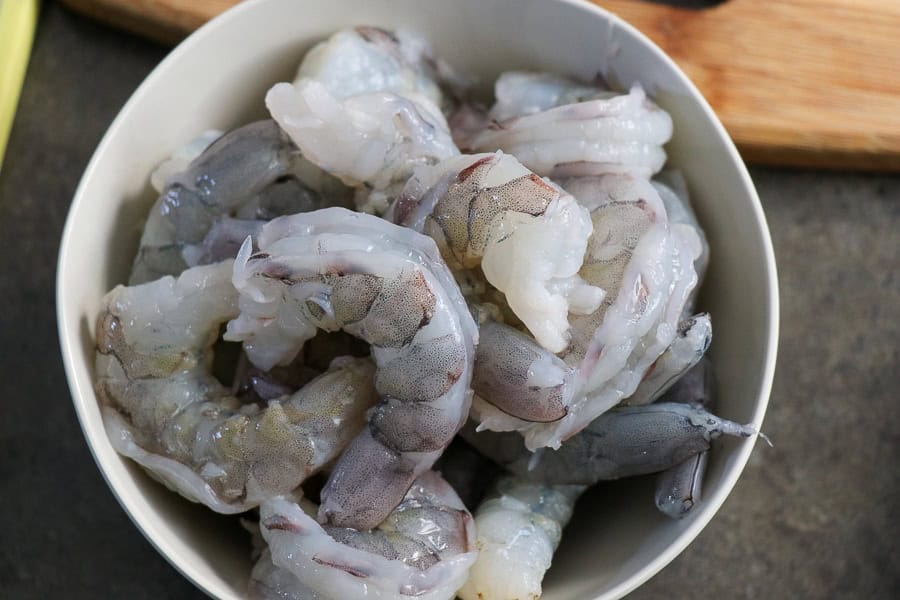
Check out how simple it is to eliminate the shrimp smell!!
- To prepare shrimp, remove the shells and devein them.
- Place the Shrimp in a bowl
- Add one (1) teaspoon of salt to the shrimp
- Stir for one (1) minute
- Rinse the shrimp under cold running water using a colander.
- Put the Shrimp back in the bowl
- Sprinkle one teaspoon of salt over the shrimp.
- Stir the shrimp for one (1) minute.
- Rinse the shrimp again.
- Sprinkle another (1) teaspoon of salt on the Shrimp.
- Stir the shrimp for one (1) minute.
- Put the shrimp in a colander and run cold water over them several times to clean them well.
One useful thing I’ve learned over the years is that shrimp can be cooked without making it taste fishy or salty. This trick to eliminate the shrimp smell can help enhance its flavor and plump it up. Even if the shrimp doesnt have a strong scent, this quick and easy trick always works. Give it a try and see the difference it can make to your dish.
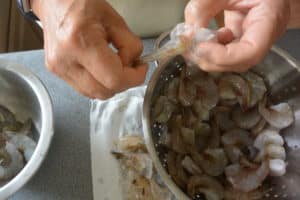
Place the shrimp into a bowl
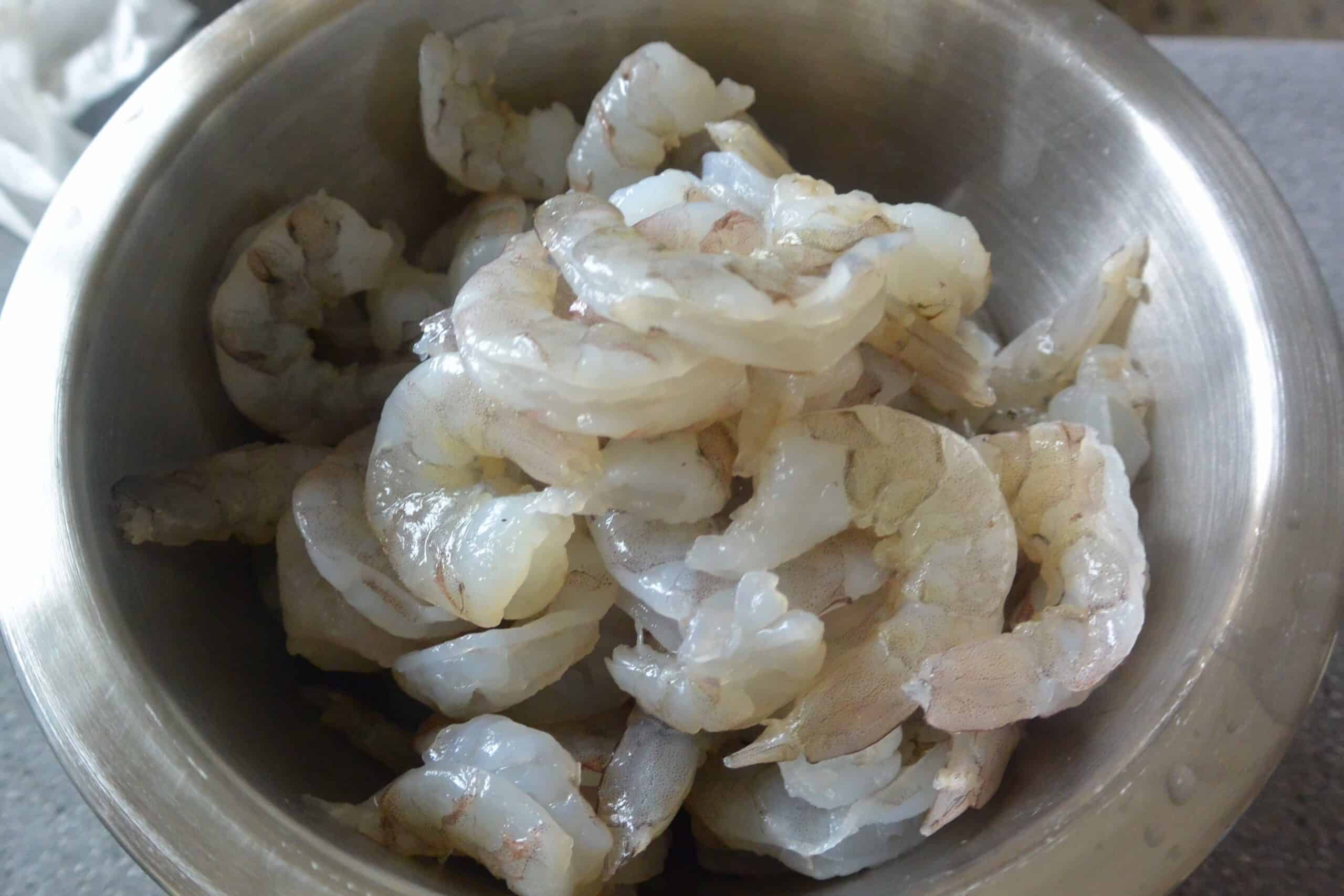
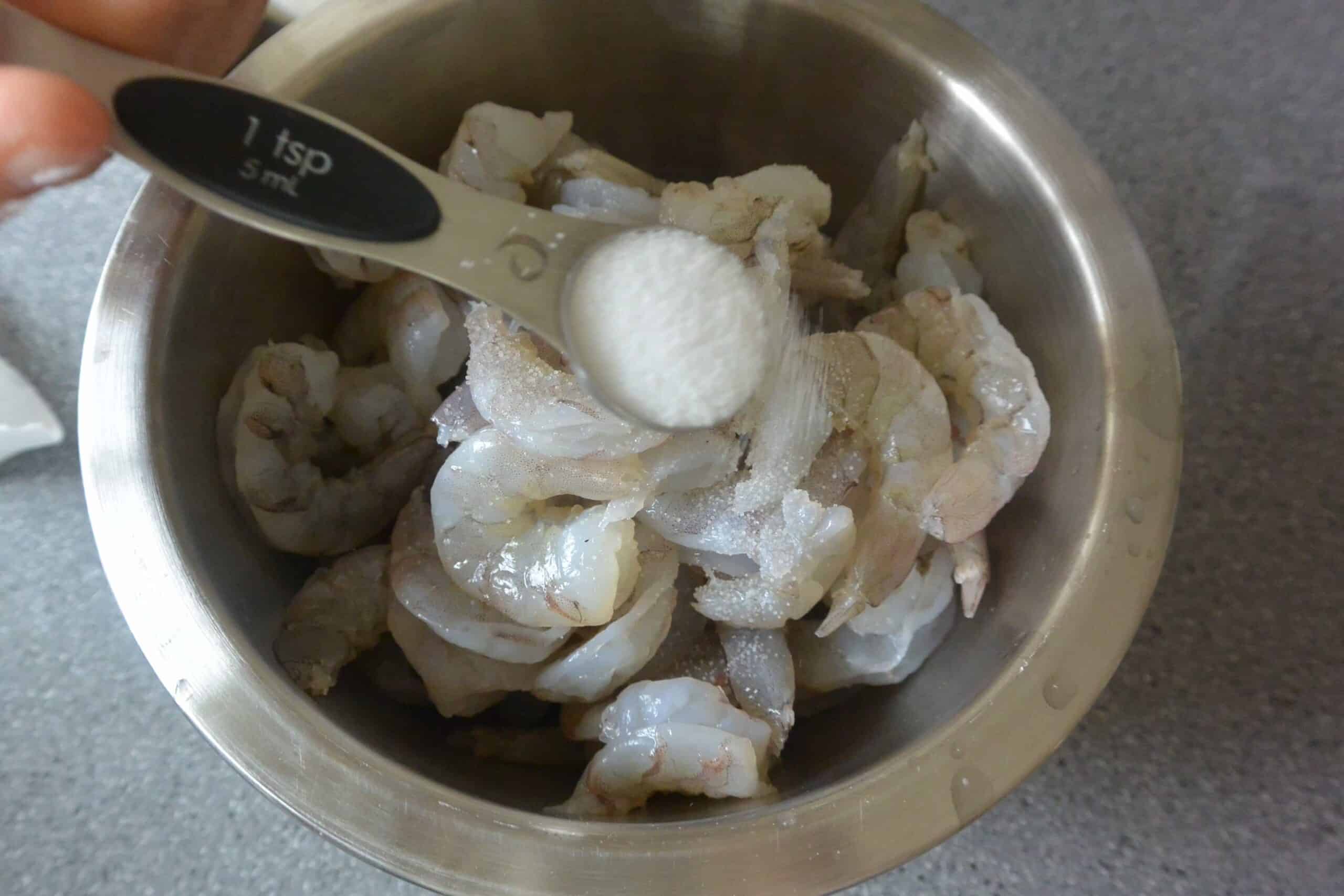
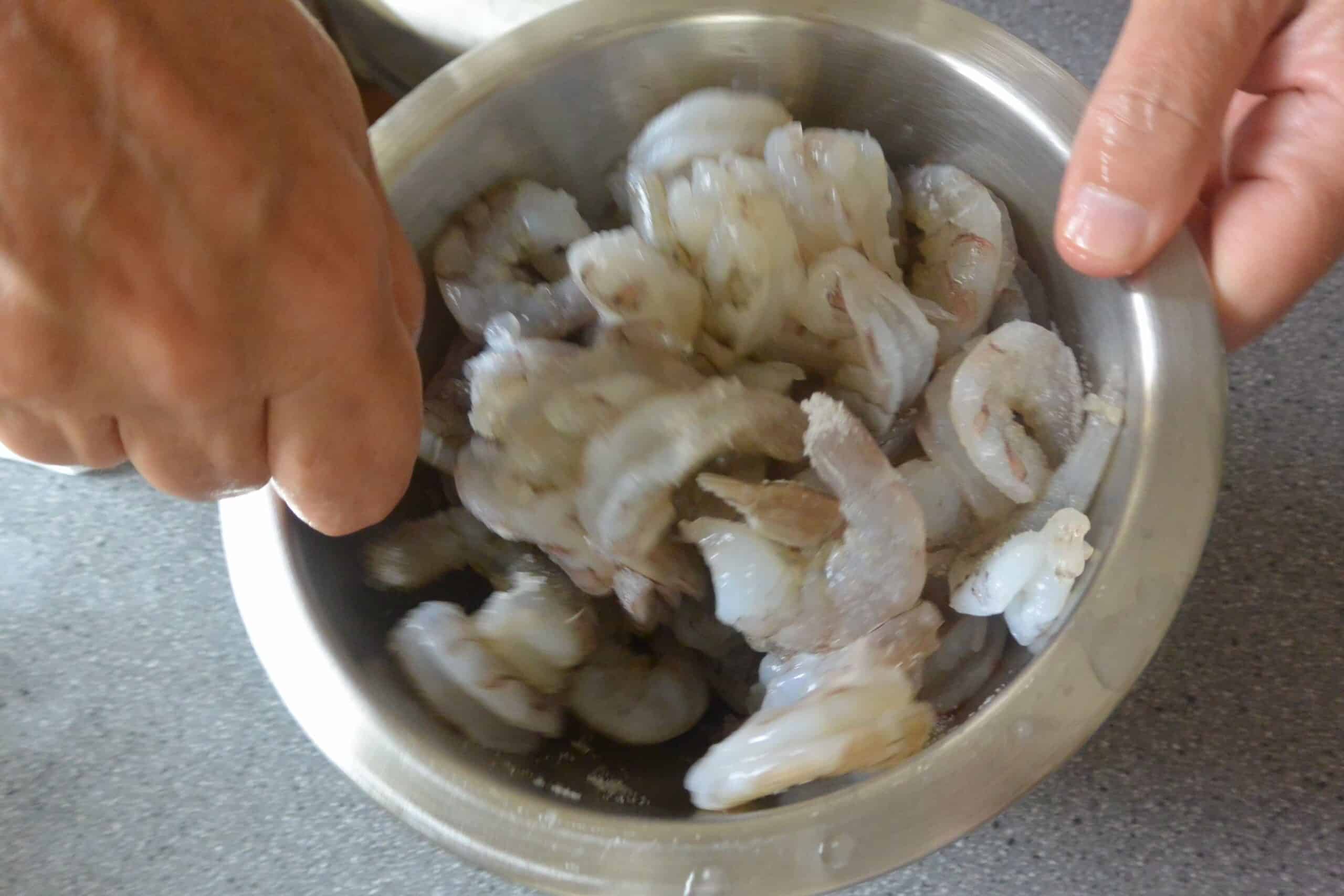
How do you get the fishy smell out of frozen shrimp?
What does bad shrimp smell like?
Many folks relate the smell of bad shrimp to ammonia. Good shrimp may have a lingering salty aroma or very little “fishy” smell, so feel free to open the bag and take a big whiff. Your last proxy is the texture of the shrimp. If you pick a shrimp up and it is covered in a layer of thin film or slime, then it’s time to throw it out.
How do you know if shrimp has gone bad?
Shrimp, but also seafood in general, should not have a strong smell. You should be able to smell a faint salt water scent from them when not frozen, and basically nothing while they’re frozen. If they’re smelling a lot, that’s a sign they may have gone bad. It’s impossible to say exactly what went wrong with them.
How do you know if shrimp is fresh?
If it smells overly fishy or sour, it’s likely, not fresh. Check the eyes: The eyes of fresh shrimp should be clear and shiny. Avoid shrimp with cloudy or dull eyes, as this is a sign that it’s not fresh. Watch out for signs of discoloration: Fresh shrimp should not have any discoloration, such as yellowing or browning.
How do you get rid of shrimp smell?
Check out how simple it is to eliminate the shrimp smell!! To prepare shrimp, remove the shells and devein them. Rinse the shrimp under cold running water using a colander. Sprinkle one teaspoon of salt over the shrimp. Stir the shrimp for one (1) minute. Rinse the shrimp again. Sprinkle another (1) teaspoon of salt on the Shrimp.
